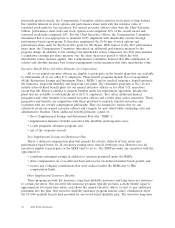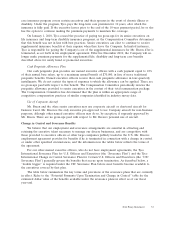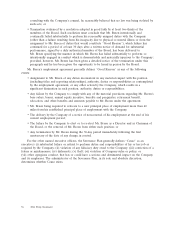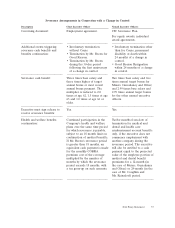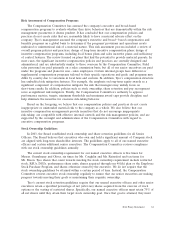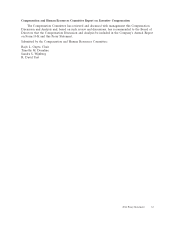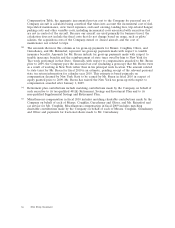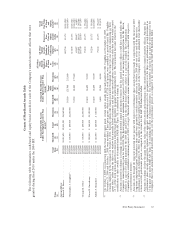ADT 2010 Annual Report Download - page 68
Download and view the complete annual report
Please find page 68 of the 2010 ADT annual report below. You can navigate through the pages in the report by either clicking on the pages listed below, or by using the keyword search tool below to find specific information within the annual report.Role of Independent Compensation Consultant and Company Management
In carrying out its role in establishing executive compensation plans, the Compensation Committee
receives advice from an independent compensation consultant, and considers pay strategies and
recommendations prepared by the Company’s management. Under its charter, the Compensation
Committee has the sole authority to retain, compensate and terminate the independent compensation
consultants and any other advisors necessary to assist it in its evaluation of director, Chief Executive
Officer or other senior executive compensation. Since fiscal 2007, the Committee has retained
Exequity LLP (‘‘Exequity’’) as its independent compensation consultant to provide services exclusively
to the Compensation Committee. Among the responsibilities of Exequity are the following:
• conducting an ongoing review and critique of Tyco’s director compensation programs;
• providing an ongoing review and critique of Tyco’s executive compensation philosophy, the
strategies associated with it, and the composition of the peer group of companies;
• preparing periodic analyses of data, including data on competitive executive compensation;
• presenting updates on market trends;
• attending regular and special meetings of the Compensation Committee; and
• regularly conducting private meetings with the Compensation Committee and/or Board without
management representatives.
In general, the independent compensation consultant develops pay strategies and recommendations
relating to the Chief Executive Officer, which the consultant provides to the Compensation Committee.
The Compensation Committee and the consultant then review and discuss all matters involving the
Chief Executive Officer’s compensation. After this review, the Compensation Committee prepares its
own recommendation for the Board to review and discuss. The independent members of our Board
have the sole authority to approve compensation decisions made with respect to the Chief Executive
Officer, and the Board has established the scorecard against which the performance of the Chief
Executive Officer is measured. The basis of the scorecard is the financial plan, as approved by the
Board. However, the Compensation Committee reviews and approves the performance goals and
objectives relevant to the Chief Executive Officer’s compensation, evaluates his performance in light of
those goals and objectives, and, based upon this evaluation, recommends his compensation for approval
by the independent members of the Board.
With respect to the Company’s other Senior Officers (‘‘Senior Officers’’ are defined as the
Company’s ‘‘Section 16’’ officers who are required to report trading in Tyco securities under the
Securities and Exchange Act) and employees, it is the Chief Executive Officer and the Senior Vice
President, Human Resources and Internal Communications, who develop the pay strategies and
recommendations, which the Compensation Committee then reviews. However, the authority to
approve those strategies and recommendations resides with different parties according to the
employee’s level. For Senior Officers, decisions must be approved by the independent members of the
Board, subject to the Compensation Committee’s authority regarding performance measures. For
employees below the level of Senior Officer, the Board has granted the Chief Executive Officer and his
designees the authority to approve pay actions. However, the Compensation Committee is responsible
for approving actions related to other aspects of the compensation of these employees, such as the size
of bonus pools, annual incentive plan performance goals, equity award design, equity value ranges and
share pools, and compensation packages for highly compensated employees who are not Senior
Officers.
60 2011 Proxy Statement




